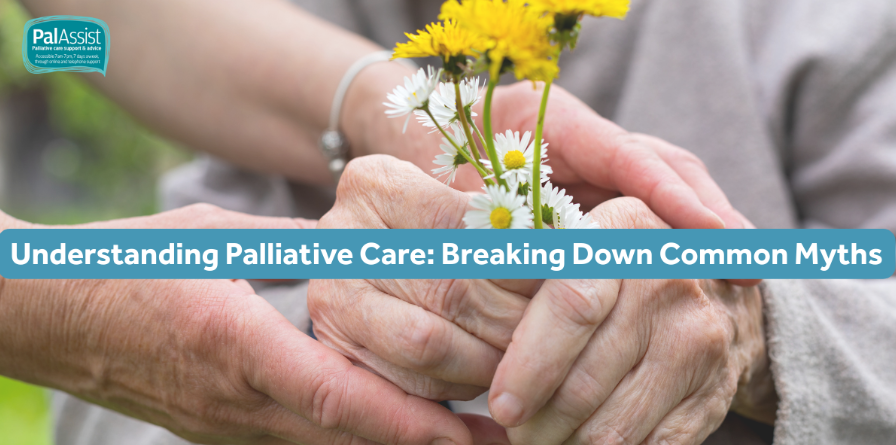
Understanding Palliative Care: Debunking Common Myths and Misconceptions
When Sarah’s mum was diagnosed with heart failure, the GP mentioned palliative care, and Sarah panicked. If this sounds like you, you’re not alone. Many families delay seeking palliative care due to myths about timing and what these care services offer.
The truth is, palliative care education helps family members access life-improving support when needed most. At Pal Assist, we see this regularly. Families who could benefit from palliative care services often wait too long because they don’t understand what quality support means.
In this guide, we’ll break down palliative care myths, explain how Australian care services work, and show you practical ways to access resources for your family. You’ll learn what advance care planning offers and how to improve the quality of life.
Ready to explore more about it? Let’s clear up these misconceptions.
What Does Palliative Care Mean?
Palliative care is specialised medical support that improves the quality of life for people with serious life-limiting illnesses. But let’s make it clear that it’s not what you think.
Many people believe palliative care means giving up treatment, only helps dying patients, only works for cancer or requires moving to a hospital. We understand why these misconceptions exist, and we want to set the record straight.
Breaking Down Palliative Care Myths
People often think palliative care means you’re done fighting your illness. This couldn’t be further from the truth. We encounter this misconception daily, and it breaks our hearts because families miss out on valuable support.
Here’s what actually happens: palliative care becomes your teammate, not your replacement plan. Your oncologist keeps prescribing chemo, your surgeon schedules procedures, and your treatment plan stays exactly the same. Meanwhile, palliative care specialists focus on making you feel better through it all.
Another common myth says palliative care is only for people who are dying. This stops families from getting help when they need it most.
Palliative care helps with any serious condition that affects your daily life. We’re talking about heart disease, kidney problems, dementia, COPD and many other symptoms that make life harder. Instead of focusing on curing the disease, the palliative approach focuses on managing symptoms and improving quality of life.
Some people also believe palliative care means losing your current doctors or moving to a hospital. But that’s not true at all. Most palliative care happens at home or in your usual care setting.
The focus is on making you comfortable wherever you are. Health professionals trained in palliative care help control pain, reduce nausea, improve sleep and support your family through difficult times. When patients receive palliative care, they often tell us they feel more like themselves again. That’s the goal to help you live better while dealing with illness.
See also: Using Tree Services To Promote Long-term Plant Health
How Australian Government Services and Care Coordination Work
The best part about Australia’s palliative care system is that most care services are free or heavily subsidised by the Australian government. If you’re worried about costs, we have some good news to make you satisfied.

Medicare Coverage for Palliative Care
Medicare covers palliative care consultations with minimal out-of-pocket expenses. Your GP can refer you directly to specialist palliative care teams without lengthy wait times (in most cases, within a week or two). This means you can access expert symptom management and family support through the public health system.
How Aged Care Integrates with Palliative Support
Aged care services integrate seamlessly with palliative care when needed. If your loved one lives in aged care, the facility coordinates with palliative care teams automatically. You don’t need to manage multiple appointments or navigate complex referral systems yourself.
However, the coordination happens behind the scenes. When someone in aged care needs palliative support, their care manager contacts the local palliative care team. It saves families from making countless phone calls and reduces stress during difficult times.
Free Queensland Health Services
Queensland Health funds free support services like Pal Assist across the state. This means expert advice, resources and local service connections cost you nothing. Our registered nurses help connect you with everything from home nursing visits to equipment loans (like hospital beds or wheelchairs).
You can also access palliative care training and education programs through community health centres. So, how are these sessions helpful, though? Well, most family members and aged care workers develop practical skills for providing better support at home throughout these sessions.
If you don’t know these services exist, you’re not alone. Many people assume private health insurance is required, but the Australian government ensures palliative care remains accessible regardless of your financial situation.
Advance Care Planning: Your Roadmap to Better End-of-Life Care
What would happen if you couldn’t speak for yourself during a medical emergency? That’s where advance care planning comes in. It helps ensure your voice is heard, even when you can’t speak for yourself.
First Things First: Advanced Care Planning
Advance care planning conversations give families clarity about care preferences and help them explore the options available. You might be surprised how much control you have over your health care decisions, even when facing serious illness.
These conversations don’t have to be scary or morbid. Think of them as practical discussions about what you value. In fact, many families tell us they feel closer after having these talks together.
Legal Documents That Protect Your Wishes
Advance care planning documents ensure your wishes guide medical decisions if you become seriously ill. One of the most important tools is an Advanced Health Directive.
This legal document outlines your specific healthcare preferences and gives your family clear guidance during difficult times (when emotions run high and decisions can feel overwhelming).
You can also appoint someone you trust using an Enduring Power of Attorney. This legal document allows them to speak for you if you’re unable to communicate your preferences to health professionals.
Benefits of Early Planning
Early advance care planning reduces family stress and improves care coordination between different health services. Families who practice advance care planning report feeling more confident about decisions and less guilt about care choices.
This preparation creates a smoother experience for everyone involved. When you’re dealing with a terminal illness or other serious health condition, your family already knows what you want. That means health professionals can focus on delivering the best possible support without having to second-guess your preferences.
At Pal Assist, we help families approach these conversations with compassion and practical guidance. Our registered nurses can connect you with resources and education about advanced care planning in your local area.
Getting Real Support Through PalAssist and Local Care Services
Pal Assist is Queensland’s free lifeline that connects you with palliative care support in minutes, offering education and training resources when you need them. Here’s what we provide:
What Pal Assist Offers
- Free phone support 7 am to 7 pm, seven days a week
- Health professionals are available for a range of palliative care concerns
- Registered nurses who understand what families experience
- Help finding local resources and care services
How We Connect You with Local Services
- Direct connections to specialist palliative care providers across Queensland
- Support accessing the right resources for your specific needs
- Coordination with your existing health care team
- Communication with GPs and hospital teams about care plans
Who Can Access Support
- Anyone with a life-limiting illness
- Family members and carers (no referral needed)
- Aged care workers seeking education and skills development
- Up to two telephone counselling sessions with follow-up calls
- Completely free service funded by Queensland Health
Common Questions About End-of-Life Care
Now that you understand what palliative care offers, let’s address the most common questions families ask about end-of-life care. These answers will help you reduce anxiety and provide clear information for better planning.
How long can the end-of-life stage last?
The end-of-life stage can vary from days to months, depending on the person’s condition and overall health. Primary care doctors and specialists can provide more specific timeframes based on individual circumstances.
What exactly is end-of-life care?
End-of-life care focuses on comfort, dignity and quality of life during a person’s final stages of terminal illness. It includes pain management, emotional support and helping families prepare for death.
What are the 7 Cs of end-of-life care?
The 7 Cs are: Communication, Compassion, Competence, Coordination, Continuity, Comfort and Closure. These principles guide health professionals in providing comprehensive end-of-life support.
What are the three most important end-of-life care issues?
The three main priorities are pain and symptom control, emotional and spiritual support for patients and families, and ensuring the person’s wishes are respected throughout their care.
Taking the Next Step
Understanding palliative care means recognising it as life-improving support, not end-of-life surrender. These care services work alongside your current treatments to enhance the quality of life for you and your family.
Now that you know the truth about palliative care, don’t let misconceptions prevent you from getting help when you need it. Palliative care education helps families make wise decisions about their health care options during challenging times.
At PalAssist, we’re here to provide free guidance and connect you with local palliative care services across Queensland. Call 1800 772 273 to speak with our registered nurses today.




